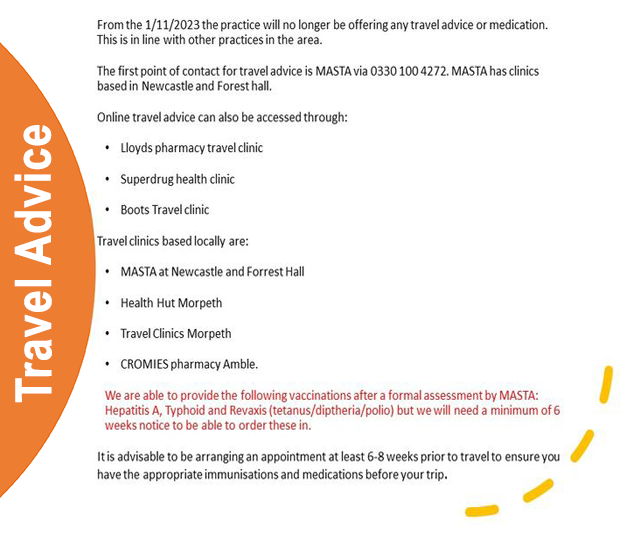Flu Vaccination
We ask you to support the surgery and have your vaccination using our services but acknowledge that there is choice for patients to attend other venues.
This year the NHS changed the vaccination programme throughout the country. There were 3 vaccinations on offer:
- Adjuvanted Trivalent Flu Vaccine (aTIV) this is licensed for people over the age of 65.
- Quadrivalent Vaccine (QIV) this is licensed for children 6 months - 2 years and 18 years to less than 65and who are in an at risk group this includes people with, Chronic Respiratory Diseases (including Asthma), Heart Disease, Renal Failure, Diabetes, Weak Immune System, Pregnant ladies and Carers.
- Live Attenuated Influenza Vaccine (LAIV) This is a nasal spray and licensed for children 2 years to 18 years of age. Those aged 2 and 3 will be vaccinated by GP surgeries. School aged children in reception class through to year 5 will be vaccinated by schools. Please note that we will not be able to vaccinate any child in the school year groups. These nasal sprays will be available to order from 9th October. Please ring the surgery to make an appointment.
Flu vaccination usually begins in the late Autumn. Please check this website for more information nearer the time.

Shingles Vaccination
This is an opportunistic programme and patients who are eligible need to contact the practice to book an appointment.
The ages being invited for vaccination this year are those patients who are aged 70 but not yet 71 on 1 September 2015 and have not previously had a shingles vaccination. Patients who achieved the age of 70 on or after 1 September 2013. Patients aged 78 on 1 September 2015 are also eligible and remain eligible for vaccination until their 80th birthday.
Public Health England initiated the Shingles vaccination in 2013 to reduce the incidence and severity of shingles disease, whilst significantly reducing skin infections and nerve pain. The vaccine hopefully will reduce the unpleasant side effects and offers the best protection available.
Pneumovac
Pneumococcal infection is caused by Streptococcus pneumoniae - a common cause of pneumonia which can also lead to invasive disease including meningitis and septicaemia. More information can be found on NHS Choices website.
If you want to check if you are eligible or would like to make an appointment please contact the surgery.
There are three groups of people who need to be vaccinated against pneumococcal infections:
- Babies
- people aged 65 and over
- anyone between the ages of two and 65 with a long term health condition
Babies
Babies are routinely vaccinated with the a type of pneumo jab known as the pneumococcal conjugate vaccine (PCV) as part of their childhood vaccination programme. They have three injections usually given at:
- two months old
- four months old
- 13 months old
Adults aged 65 or over
If you are 65 or over you will be offered a type of pneumo jab known as the pneumococcal polysaccharide vaccine (PPV). This one-off vaccination is very effective at protecting you against serious forms of pneumococcal infection.
People with health problems
The PPV pneumo jab is available on the NHS for children and adults aged from two to 64 years old who are at a higher risk of developing a pneumococcal infection than the general population. Children up to five years old who are at high risk may also need the PCV (because the PPV jab doesn't always work in young children).
You're considered to be at a higher risk of a pneumococcal infection if you have:
- had your spleen removed, or your spleen does not work properly
- a long-term respiratory disease, for example, chronic obstructive pulmonary disease (the name for a collection of lung diseases that make it difficult to breathe)
- heart disease, for example, congenital heart disease (a birth defect that affects the heart)
- chronic kidney disease
- chronic liver disease, for example, liver cirrhosis (when healthy tissue in the liver is destroyed and replaced by scar tissue)
- Diabetes
- a suppressed immune system caused by a health condition such as HIV
- a suppressed immune system caused by medication such as chemotherapy or steroid tablets
- a cochlear implant (a small hearing device fitted inside your ear)
- had cerebrospinal fluid (the clear fluid that surrounds the brain and spine) leaking from its usual position, for example, as the result of an accident or surgery